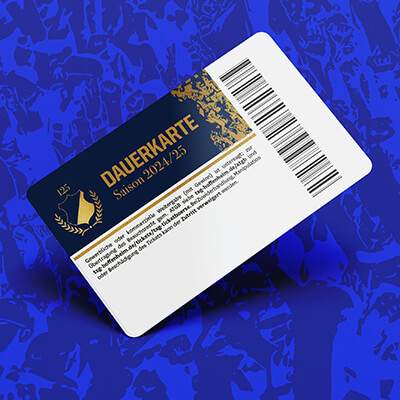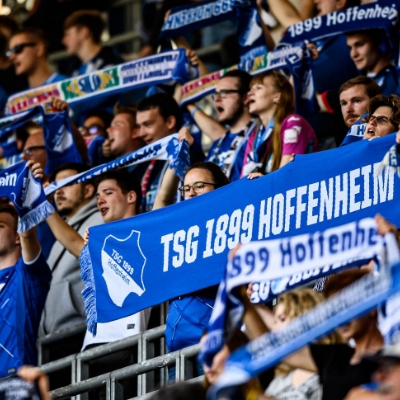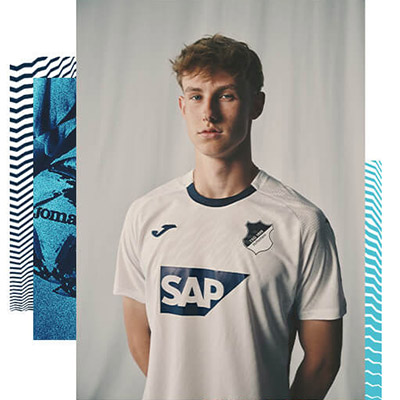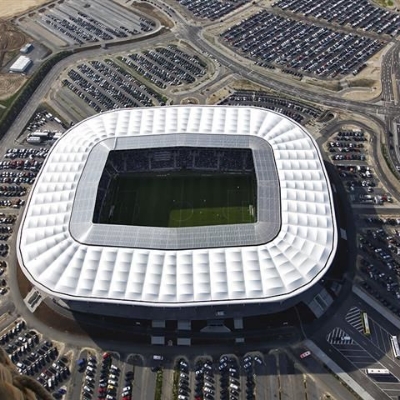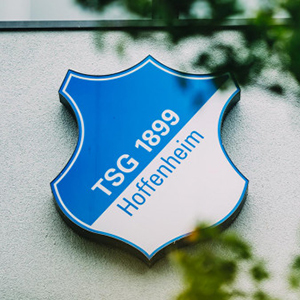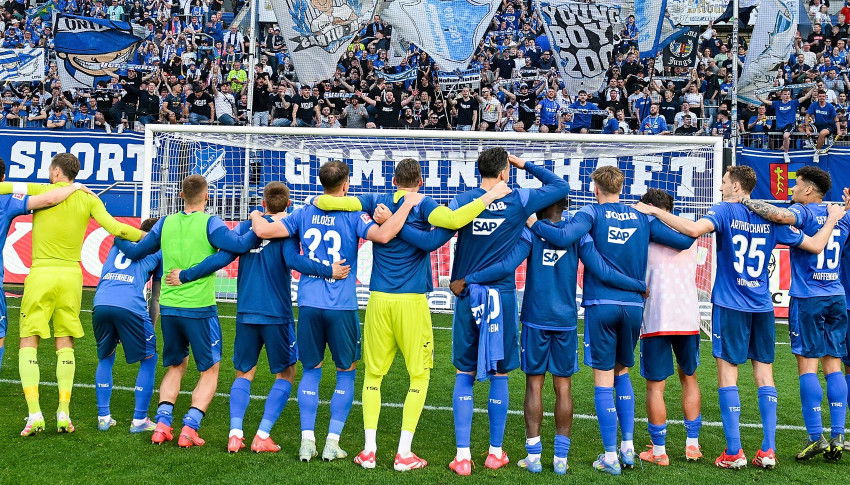''I would like to be a role model''
Erëleta, how have you settled here in the region and at TSG?
''To begin with it was tough on a footballing level, as the style of play here at Hoffenheim is completely different to what I'm used to. But that's the reason I chose to come here. Training is a lot of fun. We play football, with emphasis on the 'play' element. That really suits me. I love to find solutions with the ball at my feet, instead of just lumping it forward and chasing after it all day. I feel like I've come to the right place.''
You moved to TSG Hoffenheim from SC Freiburg. Do you feel there is a different, perhaps higher level of expectation on you here?
''Coming to TSG has definitely been a step-up. The ambitions are higher, as well as the competition in my position. But I have so much drive to learn new things here in Hoffenheim. I shot up through the ranks so quickly at Freiburg, which made me curious to see how far I could go. When the offer came in from TSG, I said to myself: 'This is the place where I want to push my boundaries.''
You're also closer to your parents' home in Fichtenberg, near Schwäbisch Hall. Was that another factor in your decision?
''Definitely. Back when I was at Wolfsburg, my parents were six hours away. And Freiburg wasn't exactly just round the corner either. Being just an hour's drive away means I can see my family a lot more often; for example my parents come to every home game. That makes me really happy, as I need the support of my family, and I've always been able to count on it.''
What role did your family have to play in you becoming a professional footballer?
''The most important one. My dad almost forced me to play football (laughs). I have two brothers that always used to play in football clubs, and I would have kickabouts in the garden with them. One day, when I was 11 years old - so relatively late - he said: 'Come on, we're going to training.' But I didn't want to, and I told him: 'No, football is for boys.' ''
It seems your dad didn't let that fly...
''He almost forced me onto the pitch and took part in my first training session. Eventually I was so absorbed in the game that I didn't even notice that my dad had moved over to the sidelines. After training, the coach said: 'Hey, we're making up your player licence right away.' So that's when I started playing in the U13s of local team SK Fichtenberg. I didn't play in a women's team until U17 level. So I really learned the ropes playing by the boys.''
I'm sure your brothers helped…
"I played with my big brother Vigan for years at SK. I lined up on the left wing, he was behind me at full-back. It wasn't so often you saw a brother and sister in the same team, a boy and a girl. Actually, he wanted to play on the left wing. I snatched his favourite position from him. (laughs). As a boy of that age, it must have been weird for him sometimes when the spotlight was on me as a girl. But he always supported me, and sometimes even bragged: "That's my little sister." I thought that was cool. And then I was sure that my brothers (Vigan, and Librun, who is two years younger; editor's note) didn't have a problem with it.''
The appreciation for women's football, particularly among men, has gone up significantly since the Euros in the summer. Would you agree?
''A lot of people were inspired by the tournament. I found it particularly nice that this wasn't just in Germany. When I visited my relatives in Kosovo after the Euros, my seven-year-old cousin told me that she'd watched the final. Unbelievable. I just thought 'Wow', the enthusiasm made it here. The Euros really set a milestone.''
You've committed yourself to Kosovo, and won your first international cap back in September 2020. What do you make of the game's development there?
"Women's football in Kosovo is still in its infancy. There is a league, but there is still a lot that is lacking, of course. In Germany, for example, there are more than 800,000 female footballers, in Kosovo about 660 - in the whole country. That's not even one percent of the female population. But we are a young and small country - and the women's national team was only founded in 2016. That's why I'm sure there can and will be a lot more to come."
You were born in Schwäbisch Hall and represented Germany at youth level until 2018. Why did you decide to switch to Kosovo?
''I played for Germany until U20 level, and I didn't even know there was a Kosovo team. Then, in 2018, I got a call from the association asking if I would like to help build something in Kosovo. I had a fair bit of experience from the Bundesliga 2 and the Germany youth teams. I was still really young, just 19, and I thought taking on that responsibility sounded like too big a task. I wasn't sure I was ready.''
And then you gave it a shot.
"I went to Pristina for a friendly match. When I was there, I saw that there was still a lot of work to be done. But I was able to contribute so much in the first training course that I immediately found my role. It was a decision of the heart, as simple as that. I felt at home there. Later, when I told my parents that I was leaning towards Kosovo, I realised how proud they were that I would be playing for the country of their birth.''
How different is playing for your national team when there's more at stake than just sport?
"Having the social dimension adds a special incentive. It is an absolute honour to help take women's football in Kosovo to a new level. I want to convince girls to play football, to be brave. I myself had to be convinced by my father. Now I want to be a role model for women and girls to take this step themselves. I see this as part of my mission with the national team, as well as playing football. You can't be afraid to take on responsibility. I travel there full of confidence and say, 'Yes, let's do this'."
How fulfilling do you find this role?
''Unbelievably so (haha). It makes me really, really proud. And it touches me to make my parents proud as well. I feel at home in Kosovo, I smile all the time. If more and more girls start playing football now, and the number becomes much bigger than the current 660, then it will still fill me with pride when my career is long over and I'm just sat at home watching on TV. I will be so thankful that I chose to do it this way.''
As well as being the key player in the national team, you're also the captain.
''We have a lot of players with potential, but most of them play in Kosovo at clubs that lack fundamental training, for example in tactics. Sometimes that's really difficult, but we're on the right track there, too. Basically, there is already a lot of enthusiasm in Kosovo for the still young national team: at my first international match, 4,000 people were there. I was amazed."
What makes Kosovo and its football so special?
"Our defining personal trait is pride. If you apply that to football, it means that when we lose the ball, we don't just accept it, we fight to win it back. It all comes down to mentality. We have a saying in Albanian: Sorry, we are like warriors."
Your family's story is closely tied to the country's history. Did you have much of a sense of this growing up?
"My parents fled to Germany in 1997, shortly before my brother Vigan was born - we were ultimately war babies. My father was in the war, my uncle too - as the next generation, you see the consequences. Their stories are very emotional, you learn what they went through, how they had to flee. Of course that shapes you, it does something to you. Meanwhile, when I'm in Kosovo, older people often ask me: "Do you still have family?" They ask because they don't know if I have a mum and dad or if I grew up as an orphan. It could have been my parents who died in the war. In moments like that, you feel how close it all still is. I think that wound is deep inside all of us."
Did you still feel the traces of the conflict today?
"The current conflicts are more in northern Kosovo, so my family in the south is not directly affected. But the consequences are always noticeable. In the European Championship qualifiers, we had Russia in our group. This is a country that refuses to recognise us. That meant we had to play both games on neutral ground. You just think: all we want to do is play football, and all this political stuff gets in the way.''
The same is true for everyday life...
"When I was in Mallorca in the summer, I uploaded a few pictures to the family WhatsApp group. And my mother wrote: 'Oh, this looks so beautiful. I'd love to go to Mallorca.' I was about to book flights for next year when she told me: 'I'm not allowed to go there. I have a Kosovan passport.' That's when I realised that my parents would not be able to go there because Spain doesn't recognise Kosovo."
Given your family history, to what extent do conflicts and wars like the one in Ukraine impact you differently?
"On 24 February, when Ukraine was attacked, it felt a bit like going back in time for our family. We were all hit with a feeling of sadness during those first days of the war. Something like that just shouldn't happen in modern times. It's very scary and extremely sad."
A conflict between two closely linked nations and peoples. It seems like tensions can endure for decades.
"Yes, when you've been to war and almost sacrificed your life for it, it's probably completely normal that you develop a certain scepticism. But I have to say that my father - especially considering what he himself went through in the war - was very open. I had a Serbian boy in the team and my father, who knew Serbian, would often talk to his father on the sidelines - and the two men got on well. He then came out with two really meaningful sentences: 'You know, Eri, it all varies from person to person. You can't put everyone in a box.' I've always kept that in mind."
From person to person is a good way of putting it. The role of women is also seen quite differently in Kosovo.
"There are real contrasts, I would say. In bigger cities like Pristina it is a lot more modern, in other regions it can still be very backward. On holiday, I rode my bike from our house to the city centre to go shopping. And I was gawked at in astonishment by a lot of passers-by: 'There's a woman riding a bike.' (shakes her head laughing). There are many who still have a very backward view of society - but there are also more and more who are modern and open. I think it's about fifty-fifty - and more needs to be done to develop Kosovo into a more cosmopolitan society. At least the country is now governed by a female president.''
You were brought up in a different way.
"Absolutely. I'm proud of the way I was raised - especially compared to how things were for my parents. Other people from my culture often say to me: 'Wow, your parents let you move to Stuttgart alone to play football when you were 16, 17 years old. We would never have done that with a girl.' I can only smile wearily. I'm glad I had my parents' trust and was able to become independent. When I see that there are women in other countries who are oppressed, it makes me angry, but also sad. I ask myself why things like this still happen. We can't keep these old ways of thinking going on forever. It is high time to arrive in the present."





